Recycled PET suppliers
When you buy a PET-packaged product, you’ve selected a package with a well-established, readily available end-of-life option: recycling. PET, or Polyethylene Terephthalate, is the most recycled plastic in the world and is 100 percent recyclable.
PET containers are collected from recycling bins or other sites, sorted, processed, cleaned, and remanufactured into a range of new items. New PET bottles and jars, carpets, apparel, industrial strapping, rope, automotive components, fiberfill for winter coats and sleeping bags, building materials, protective packaging, and more are all popular products manufactured from recycled PET.
MONOPOLY-int Recycled PET suppliers in turkey country and Exporting products and raw materials all over the world
By recycling PET material instead of dumping it in a landfill and using that reprocessed PET as a raw material for new products, greenhouse gas and carbon emissions are greatly reduced, as is the energy required to make the new product. PET is easily identifiable by its recycling code number 1.
This review article focuses on using recycled PET to make high-consumption, value-added items that are environmentally friendly and marketable.
Request a Quote
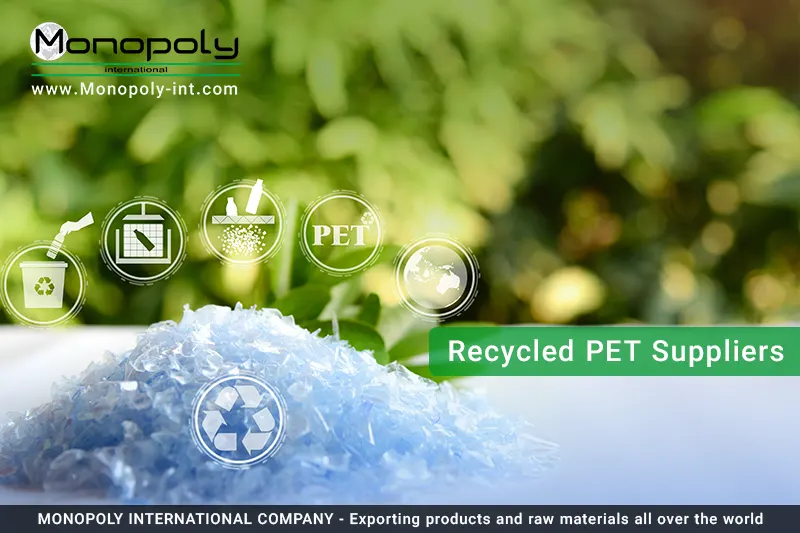

Pet recycling process
Recycled PET suppliers | What is the process of PET plastic recycling?
Not only does recycling a PET bottle prevent it from ending up in a landfill, but it also has many other benefits. Recycled PET resin is a priceless industrial input that can be processed again and again and utilized.
Read more What we can offer : Recycled material
PET has substantial benefits over other materials in terms of weight, durability, and adaptability, making it a popular polymer in the packaging and textile industries. Due to their short lifetime, almost all PET products on the market are turned into garbage, making PET a recycling priority. Let’s look at the process of PET plastic recycling:
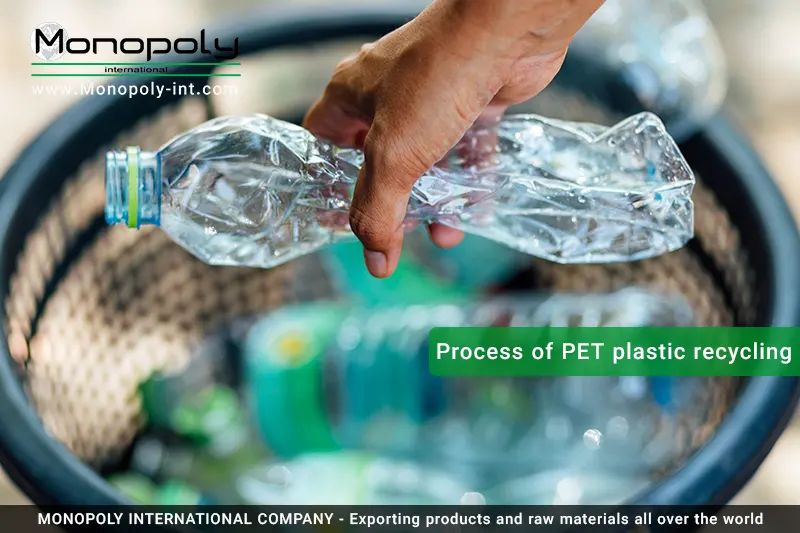
- Collection
Consumers sort PET bottles, which are then collected with other recyclables and sent to a recycling plant.
- Separation
The different recyclable components are segregated at the recycling factory, with glass and metal flowing into their respective recycling streams. After removing all non-plastic debris, high-value recyclable polymers such as PET are sorted using automated technologies or, in certain cases, by hand.
- Transport
After PET has been gathered, it is compressed so that it can be transported more easily. Due to its great lightness and ability to be compressed into tiny bundles, PET offers benefits over other recyclable packaging materials.
- Processing center
PET bottle bundles are transported to a processing facility. The bottles then go through a recycling process to become recycled PET (rPET), which can subsequently be used to make new products.
MONOPOLY-int Recycled PET suppliers in turkey country and Exporting products and raw materials all over the world
- Cleaning and decontamination procedures
Because the PET flakes include broken-down caps, rings, and labels, they must be cleaned. They are removed during the cleaning process, along with other pollutants like glue. After being washed, they go through a high-temperature decontamination procedure to get rid of any lingering post-consumer chemicals or tastes.
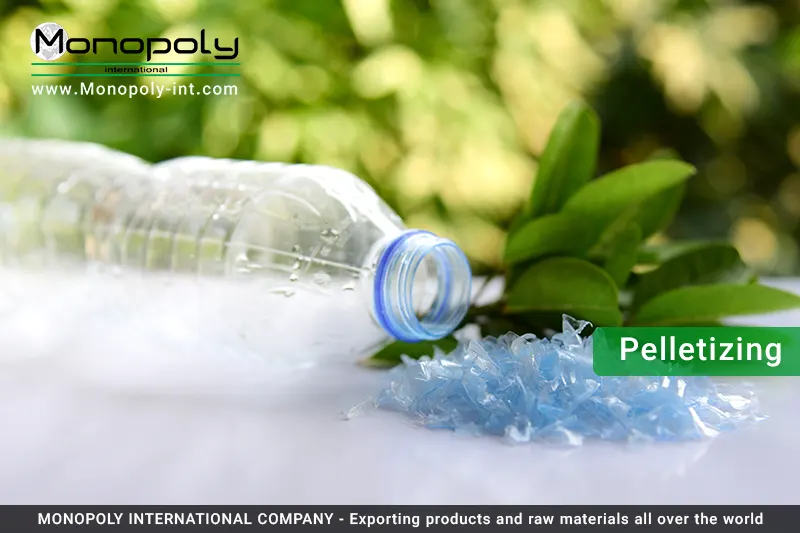
- Pelletizing
To make new PET bottles, the melted plastic must first be processed into round, crystalline pellets.
- Reformation
The packaging sector then receives this recycled PET from the producers. Next, PET pellets are processed into preforms and sent to bottle makers. After being heated, these PET preforms are shaped and sized appropriately. It is entirely safe to use recycled PET for food packaging.
request a quote
The benefits and uses of recycled PET
Recycled PET is completely recyclable and sustainable. Recycled PET, commonly known as polyethylene terephthalate, is a thermoformable polymer whose significance in worldwide circular economy projects is growing due to its practicality and little carbon impact.
Note : MONOPOLY-int Recycled PET suppliers in turkey country and Exporting products and raw materials all over the world
The applications of recycled PET are diverse and expanding. Because of its properties, it is resistant to heat while also protecting against cold. It is also lightweight and durable. As a result, it is used in a variety of food packaging. These features are paired with the fact that its transparency makes it ideal for displaying perishable goods (such as meat trays, fresh food, or bakery items) at a supermarket. It’s also great for preserving and promoting drinks.
Due to its durability, impermeability, and flexibility, recycled PET fibers are gaining popularity in the textile industry among sportswear manufacturers. Environmentally speaking, 75% less CO2 emissions are created during the production of textile clothing using recycled PET fibers compared with virgin polyester.
Also other industries have expanded the usage of recycled PET. For instance, recycled PET chips are used in the automobile sector, the detergent manufacturing business, and the creation of promotional products such as bags, bottles, and umbrellas.
The resulting recycled PET chips may be utilized again in a variety of applications, including multilayer PET tray and sheet packaging for food products, beverage containers, and cleaning products, and textile and automotive fibers.
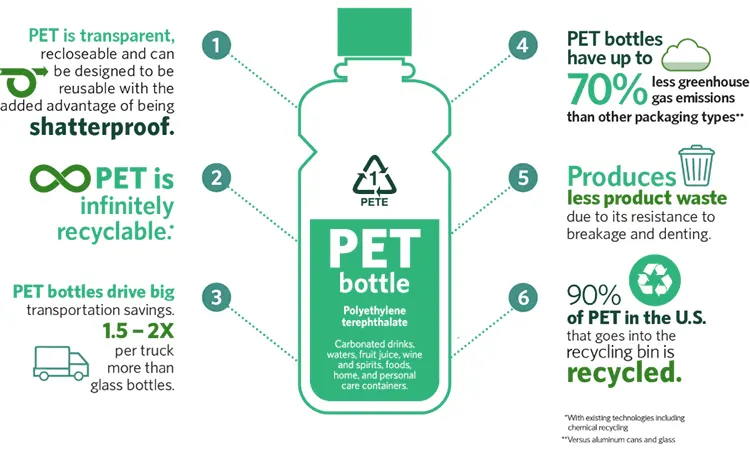
If you need a PET supplier, you can contact our experts Quotation submission form Contact us
Among the advantages of recycled PET are:
- Reduces the usage of fossil fuels significantly, produces a less carbon footprint during production than other materials and is totally recyclable.
- It is durable, flexible, and most importantly, lightweight. This last property is crucial for its transportation since its logistics have a lesser environmental effect than those of other materials.
- It is more chemically and thermally resistant.
- It is translucent, allowing the customer to view what is within.
- It has a strong abrasion resistance and is quite durable.
- It is very resistant to breaking.
- It is simple to clean.
- Its manufacturing costs are much cheaper than those of other materials, resulting in reduced water and energy use.
The growing PET plastic recycling industry
We depend on plastic in an industrialized, wealthy world. Recycling, on the other hand, must considerably increase. We can transition to a circular economy strategy via efficient and high-quality recycling, safeguarding the environment and wildlife for coming generations. Recycling rates are rising as a consequence of increased public awareness and improved recycling processes.
Recycled PET suppliers in turkey country Contact us
Due to a number of considerations, PET recyclate is expected to become more significant in this setting. The emergence of novel methods for collecting and recycling plastic packaging, which will greatly increase recycling when combined with consumer behavior changes, is at least as significant.
In several ways, recycling lessens the environmental effect of the PET sector. The primary benefit is the decreased use of raw materials. By using around 35% regranulate instead of 100% new granulate, it is possible to make new bottle preforms while using less crude oil overall. Moreover, recycling plastic uses 88% less energy than making plastics from virgin sources.
Additionally, the PET sector is streamlining transport by blowing preforms into bottles at the filling factory, therefore drastically lowering the number of truck journeys from the recycling plant. The outcome is a substantial reduction in fuel consumption and emissions.
Read More : Polymeric Materials
Important characteristics of recycled PET
People and businesses are becoming more conscious of the need of recycling plastic in order to prevent it from having a single use and so lessen its negative effect on the environment. There are several products available now that are constructed of recycled PET. The main features of these good include:
Safety
The safety of recycled PET in contact with meals and drinks has been certified. Through in-depth research, regulatory approvals, and testing, recycled PET suitability for use in food, beverage, pharmaceutical, and medical applications has been consistently shown.
Due to its unique qualities, recycled PET is quickly becoming the preferred packaging material for food and drinks throughout the globe. It is an extremely hard and inert substance that, like glass, does not react with foods, is resistant to microorganism assault, and will not biologically decay. However, unlike glass, recycled PET is exceedingly lightweight, transportable, and shatterproof.
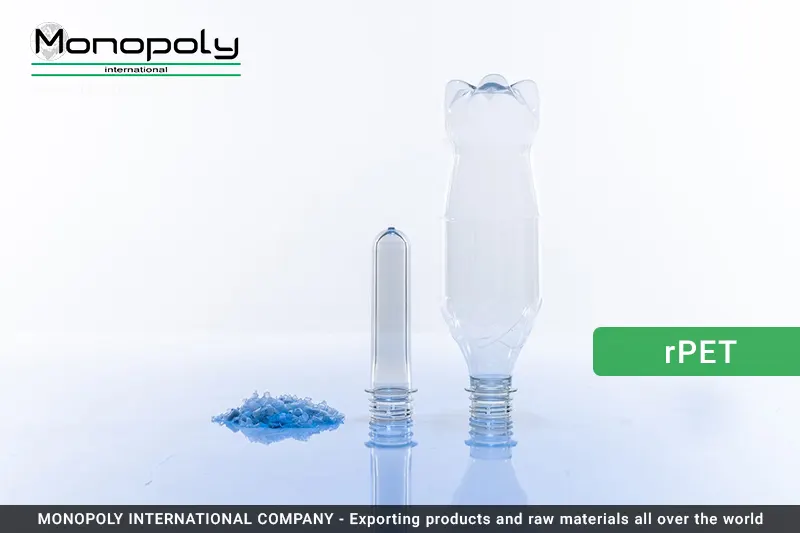
Completely recyclable
PET may be recycled professionally by thoroughly cleaning and re-melting it, or by chemically separating it to its component elements to create new PET resin. New PET bottles and jars, carpet, apparel, industrial strapping, rope, automotive components, fiberfill for winter coats and sleeping bags, building materials, and protective packaging are examples of typical recycled PET products.
Sustainable
PET is an excellent option for sustainable packaging. Compared to glass, aluminum, and other container materials, it has a highly positive sustainability profile. After recycling, its sustainability improves even more.
The high strength of recycled PET in proportion to its light weight is a significant contributor to its energy efficiency, enabling more product to be delivered in less packaging while requiring less fuel for transportation.
Conclusion
Everyone is responsible for making the earth more sustainable and cleaner. This is achievable, but needs a worldwide commitment to success. As a result, every plastic packaging put on the market must be recyclable or reusable. Currently, plastic bottles are frequently recycled. The current idea presented by the majority of recycled PET suppliers is that of a closed loop or cycle in which the yarns never lose their value and may be recycled indefinitely.
You may acquire recycled PET from suppliers if you are active in sectors such as clothes, PET bottles and jars, industrial strapping, carpet, automotive components, fiberfill for winter jackets and sleeping bags, construction materials, and protective packaging. Our organization is one of the best recycled PET suppliers in Turkey, and we can meet your needs promptly.
FAQ
PET can be recycled a number of times making it highly sustainable. It is claimed that around 60% of plastic bottles are collected and recycled in the Turkey
PET is most often used as fibres in polyester clothing, food trays and in drinks bottles. In drinks bottle production PET is often used because of its lightweight nature, making it cheaper and less wasteful to use in manufacturing.
